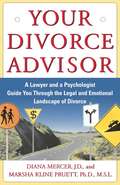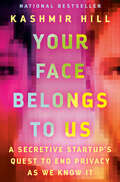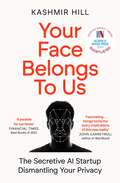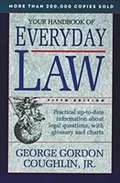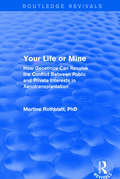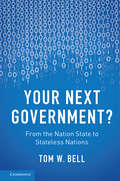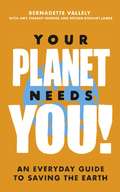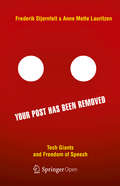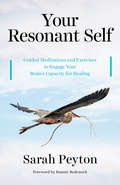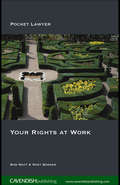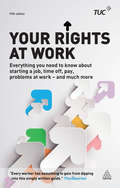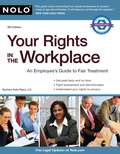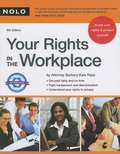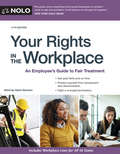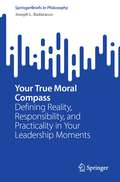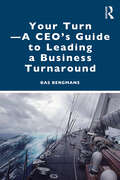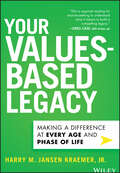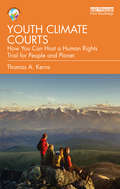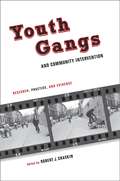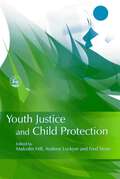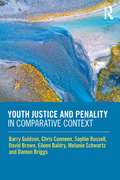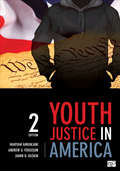- Table View
- List View
Your Divorce Advisor
by Diana Mercer Marsha Kline PruettA lawyer and a psychologist offer a groundbreaking divorce strategy that protects both your finances and your family. From your first thought of divorce through the final paperwork, Your Divorce Advisor takes you step by step toward a divorce that dissolves the marriage but not your dignity, your sense of family, or your financial security. Whether you hire a lawyer or a mediator, or do it yourself, this practical, direct, and empowering guide offers you the wise counsel you need for both the legal and the emotional processes of ending your marriage. Your Divorce Advisor shows you how to: Keep a healthy perspective that leads to a successful legal strategy and recognize when emotions threaten your case Protect your assets without destroying your family Offering: Detailed coverage of all your legal options and guidance through every legal step, including anticipating the emotional repercussions of your decisions More information on custody than any other divorce book, including age-appropriate custody schedules A sample divorce agreement explained one paragraph at a time Your Divorce Advisor helps you set yourself and your family on a positive course toward a new life.
Your Face Belongs to Us: A Secretive Startup's Quest to End Privacy as We Know It
by Kashmir HillThe story of a small AI company that gave facial recognition to law enforcement, billionaires, and businesses, threatening to end privacy as we know it&“The dystopian future portrayed in some science-fiction movies is already upon us. Kashmir Hill&’s fascinating book brings home the scary implications of this new reality.&”—John Carreyrou, author of Bad BloodLonglisted for the Financial Times and Schroders Business Book of the Year AwardNew York Times tech reporter Kashmir Hill was skeptical when she got a tip about a mysterious app called Clearview AI that claimed it could, with 99 percent accuracy, identify anyone based on just one snapshot of their face. The app could supposedly scan a face and, in just seconds, surface every detail of a person&’s online life: their name, social media profiles, friends and family members, home address, and photos that they might not have even known existed. If it was everything it claimed to be, it would be the ultimate surveillance tool, and it would open the door to everything from stalking to totalitarian state control. Could it be true?In this riveting account, Hill tracks the improbable rise of Clearview AI, helmed by Hoan Ton-That, an Australian computer engineer, and Richard Schwartz, a former Rudy Giuliani advisor, and its astounding collection of billions of faces from the internet. The company was boosted by a cast of controversial characters, including conservative provocateur Charles C. Johnson and billionaire Donald Trump backer Peter Thiel—who all seemed eager to release this society-altering technology on the public. Google and Facebook decided that a tool to identify strangers was too radical to release, but Clearview forged ahead, sharing the app with private investors, pitching it to businesses, and offering it to thousands of law enforcement agencies around the world. Facial recognition technology has been quietly growing more powerful for decades. This technology has already been used in wrongful arrests in the United States. Unregulated, it could expand the reach of policing, as it has in China and Russia, to a terrifying, dystopian level. Your Face Belongs to Us is a gripping true story about the rise of a technological superpower and an urgent warning that, in the absence of vigilance and government regulation, Clearview AI is one of many new technologies that challenge what Supreme Court Justice Louis Brandeis once called &“the right to be let alone.&”
Your Face Belongs to Us: The Secretive Startup Dismantling Your Privacy
by Kashmir HillLONGLISTED FOR THE FINANCIAL TIMES BUSINESS BOOK OF THE YEAR AWARD&‘The dystopian future portrayed in some science-fiction movies is already upon us. Kashmir Hill&’s fascinating book brings home the scary implications of this new reality&’ JOHN CARREYROU, author of Bad Blood&‘A gripping account' NEW STATESMAN ______________________________________________________________________ When Kashmir Hill stumbled upon Clearview AI, a mysterious startup selling an app that claimed it could identify anyone using just a snapshot of their face, the implications were terrifying. The app could use the photo to find your name, your social media profiles, your friends and family – even your home address. But this was just the start of a story more shocking than she could have imagined. Launched by computer engineer Hoan Ton-That and politician Richard Schwartz, and assisted by a cast of controversial characters on the alt-right, Clearview AI would quickly rise to the top, sharing its app with billionaires and law enforcement. In this riveting feat of reporting Hill weaves the story of Clearview AI with an exploration of how facial recognition technology is reshaping our lives, from its use by governments and companies like Google and Facebook (who decided it was too radical to release) to the consequences of racial and gender biases baked into the AI. Soon it could expand the reach of policing — as it has in China and Russia — and lead us into a dystopian future.Your Face Belongs to Us is a gripping true story. It illuminates our tortured relationship with technology, the way it entertains us even as it exploits us, and it presents a powerful warning that in the absence of regulation, this technology will spell the end of our anonymity. ______________________________________________________________________'I loved this. A dark and gripping story, meticulously researched and stylishly told' JENNY KLEEMAN, author of Sex Robots & Vegan Meat
Your Handbook of Everyday Law
by George Gordon CoughlinA concise and down-to-earth handbook containing everything a citizen needs to know about the law.
Your Life or Mine: How Geoethics Can Resolve the Conflict Between Public and Private Interests in Xenotransplantation
by Martine RothblattThis title was first published in 2003. Xenotransplantation - the transplantation of animal organs into humans - poses a fascinating moral dilemma. Should this ability to extend the lives of millions of older people be permitted given that it might trigger a new pandemic similar to AIDS? This study examines the moral dilemma from a combination of humanistic, legalistic, bioethical, economical and technological perspectives. The first part of the book demonstrates that xenografts are the only realistic near-term technological answer to the organ shortage problem. The balance of the book is devoted to assessing whether doctrines such as the 'right to health care' trump the moral and ethical conundrums posed by xenotransplantation. The book concludes with a 'geoethical' solution that proposes authorization of xenotransplantation subject to the prior implementation of a new international organization for epidemiology and basic health care. It also suggests that the costs of operating such an organization could be covered by a global tax on xenografts.
Your Life, Your Legacy II: Protecting the Ones You Love
by Legacy Educational Publishing MembersInformational guide to estate planning--advanced topics. Numerous spelling issues in the original text.
Your Life, Your Legacy: The Fundamentals of Effective Estate Planning
by Wayne Wilson Daniel Purtell John HaslamBasics of estate planning for the layman. "Although it is intended to provided a general introduction to the legal, accounting, tax, financial planning and investment issues that affect your estate plan, you should not reply upon this book as your sole source of information and advice for these important topics."
Your Next Government?: From the Nation State to Stateless Nations
by Bell Tom W.Governments across the globe have begun evolving from lumbering bureaucracies into smaller, more agile special jurisdictions - common-interest developments, special economic zones, and proprietary cites. Private providers increasingly deliver services that political authorities formerly monopolized, inspiring greater competition and efficiency, to the satisfaction of citizens-qua-consumers. These trends suggest that new networks of special jurisdictions will soon surpass nation states in the same way that networked computers replaced mainframes. In this groundbreaking work, Tom W. Bell describes the quiet revolution transforming governments from the bottom up, inside-out, worldwide, and how it will fulfill its potential to bring more freedom, peace, and prosperity to people everywhere.
Your Planet Needs You!: An everyday guide to saving the earth
by Bernadette Vallely Amy Charuy-Hughes Bethan Stewart JamesIf there was ever a time to stand up for your planet, for Mother Earth, this is the time. But what are the most pressing environmental issues affecting us today? And what actions can you, as an individual, take to combat them? If you want to know what you can do, then this is the book for you. Your Planet Needs You is the essential beginner's guide to understanding the environment and the threats to its wellbeing. From plastic waste to pesticides, food production and chemicals, global warming to species extinction, this book covers the topics that you need to know about.With practical and positive tips, this book will show how you can be part of the solution and help make a better world, whatever age you are.Includes sections on air pollution, environmental law, fast fashion and ethical living, as well as resources such as recommended reading and lists of groups and organisations that you can get involved with.
Your Post has been Removed: Tech Giants and Freedom of Speech
by Frederik Stjernfelt Anne Mette LauritzenThis open access monograph argues established democratic norms for freedom of expression should be implemented on the internet. Moderating policies of tech companies as Facebook, Twitter and Google have resulted in posts being removed on an industrial scale. While this moderation is often encouraged by governments - on the pretext that terrorism, bullying, pornography, “hate speech” and “fake news” will slowly disappear from the internet - it enables tech companies to censure our society. It is the social media companies who define what is blacklisted in their community standards. And given the dominance of social media in our information society, we run the risk of outsourcing the definition of our principles for discussion in the public domain to private companies. Instead of leaving it to social media companies only to take action, the authors argue democratic institutions should take an active role in moderating criminal content on the internet. To make this possible, tech companies should be analyzed whether they are approaching a monopoly. Antitrust legislation should be applied to bring those monopolies within democratic governmental oversight. Despite being in different stages in their lives, Anne Mette is in the startup phase of her research career, while Frederik is one of the most prolific philosophers in Denmark, the authors found each other in their concern about Free Speech on the internet. The book was originally published in Danish as Dit opslag er blevet fjernet - techgiganter & ytringsfrihed. Praise for 'Your Post has been Removed' "From my perspective both as a politician and as private book collector, this is the most important non-fiction book of the 21st Century. It should be disseminated to all European citizens. The learnings of this book and the use we make of them today are crucial for every man, woman and child on earth. Now and in the future.” Jens Rohde, member of the European Parliament for the Alliance of Liberals and Democrats for Europe “This timely book compellingly presents an impressive array of information and analysis about the urgent threats the tech giants pose to the robust freedom of speech and access to information that are essential for individual liberty and democratic self-government. It constructively explores potential strategies for restoring individual control over information flows to and about us. Policymakers worldwide should take heed!” Nadine Strossen, Professor, New York Law School. Author, HATE: Why We Should Resist It with Free Speech, Not Censorship
Your Resonant Self
by Sarah PeytonHave you ever noticed how cruel and self-sabotaging your critical inner voice can be? Have you been looking outside of yourself for friends and loved ones to reassure you of your worthiness and lovability?The latest developments in neuroscience unveil the amazing extent to which humans are wired for connection, belonging and resonance with other humans. This wiring for connection is so strong, our nervous systems have the capacity to become our own compassionate self-witnesses, even when we have not had access as children to stable loving presence and warmth. The field of neurobiology and the science of mindfulness reveal that the human brain is capable of being engaged in the experience of upset (fear, anxiety, depression) while simultaneously observing and holding ourselves with kindness, as a loving parent or partner would. This ability to be both experiencing and holding the experience is the key to maintaining inner calm in the face of life's challenges. If we learn to honor that each and every inner voice, no matter how distressing, has the desire to help us, we open to the possibility that each part of us has value. This help creates a gentle, accepting and warm resonance with ourselves that can remain stable and present, even when parts of us feel upset. In simple language and easy-to-follow exercises, Your Resonant Self synthesizes the latest discoveries in brain science, trauma treatment, and the power of empathy into an effective healing method that literally rewires our brain and restores our capacity for self-love and well-being. Each chapter weaves the core concepts of neurobiology with guided meditations and beautiful illustrations, painting an inspiring picture of the human brain's inherent yearning toward healing and wholeness.
Your Rights at Work (You Need This Book First Ser.)
by Rosy Border Bob WattIn an ideal world, your working relationship with your employer would be perfect. Unfortunately, sometimes things go wrong. Your Rights at Work provides you with the advice and assistance you need to put things right.
Your Rights at Work: Everything You Need to Know About Starting a Job, Time off, Pay, Problems at Work - and Much More!
by Trades Union CongressYour Rights at Work is a comprehensive, jargon-free guide to the legal rights of the employee and the responsibilities of the employer. Accessible and reliable, it offers real solutions to the problems and issues that can face anyone at work. Using the law is always a last resort, but if you have to take that step, there is practical advice on that too. Topics covered include: starting a job; parental leave and maternity rights; flexible working; equality law; dismissal and redundancy; pay and holiday rights; grievance procedures and how to enforce your rights. Your Rights at Work is written by employment experts at the Trade Union Congress (TUC). As the people who campaigned for many of the rights set out in this book, there is no one better to explain how they should apply in your workplace and what to do if they don't.
Your Rights in the Workplace
by Barbara Kate Repa J.D.The laws that protect you in the workplace explained in one easy-to-read guide! Your Rights in the Workplace is the most complete handbook on workplace laws ever published -- it's a must-have for every employee. Your Rights in the Workplace covers everything from rules for hiring and getting paid through losing a job and unemployment benefits -- all in plain English. Get the facts on: illegal firings and layoffs challenging a job loss wages and hours privacy on your email and voice mail family and medical leave on-the-job safety and health health insurance and retirement plans workplace testing sexual harassment discrimination unemployment, disability and workers' compensation insurance The 9th edition is completely updated to provide the latest legislation and case law that affects employees in all 50 states, including changes to the Family and Medical Leave Act (FMLA), new rules on COBRA continuation of health insurance, and the new Genetic Information Nondiscrimination Act (GINA).
Your Rights in the Workplace (8th edition)
by Barbara Kate RepaAttorney and legal journalist Repa uses plain language to present practical information on the legal rights of employees in the U.S. Coverage includes both federal and state regulations. A sampling of topics includes illegal firings, email privacy, family leave, on-the- job safety, sexual harassment, age discrimination, and retirement plans. The seventh edition has been updated to reflect new legislation regarding overtime pay. Annotation ©2006 Book News, Inc., Portland, OR (booknews.com)
Your Rights in the Workplace: An Employee's Guide to Fair Treatment
by Barbara Kate Repa Sachi BarreiroYour Rights in the Workplace is an invaluable reference for every employee. Whether you have questions about your paycheck, discrimination, layoffs, or benefits, you'll find answers here. Get the facts on: wages, hours, and breaks drug and alcohol testing illegal discrimination and harassment wrongful termination vacation, sick leave, and FMLA leave on-the-job health and safety health insurance and retirement plans, and unemployment, disability, and workers' compensation insurance. Your Rights in the Workplace is an easy-to-use guide on the most common legal issues employees face in the workplace. The 11th edition is updated with the latest court decisions and legislation and includes over a dozen 50-state charts.
Your True Moral Compass: Defining Reality, Responsibility, and Practicality in Your Leadership Moments (SpringerBriefs in Philosophy)
by Joseph L. BadaraccoThis book presents a new, powerful, and practical way of making final decisions on the hard, complex, uncertain problems of life and work. What if you have looked at the data, talked with trusted colleagues, and applied all the relevant managerial and ethical frameworks, but you still don't know what is right. How should you make your final decision?This crucial question is rarely asked or answered. And some standard answers – follow your moral compass, your conscience, or your values – offer more inspiration than practical guidance. This book argues that, when we make final, hard decisions, we learn what is right by defining – personally – what is right. We find moral clarity by creating it. The book presents a fresh, challenging, and practical perspective on our hardest decisions. It offers a new conceptual approach for teachers and scholars and practical guidance for leaders and managers.
Your Turn —A CEO’s Guide to Leading a Business Turnaround
by Bas BergmansA groundbreaking exploration into the intricate art of business turnarounds and swift recovery – qualified by a career’s worth of insights – in Your Turn the message is startlingly clear: a turnaround is a one-chance-only experience. This is ‘do or die,’ and if you understand that in time and act accordingly by following a robust, comprehensive, data-driven approach to survival, your company stands a good chance of weathering the storm.Your Turn is a practical guide for executives to lead their own business turnarounds. With meticulous detail and respected leadership insights, the author has built a step-by-step approach that has served him well in delivering successful business turnarounds.Packed with real-world business examples and instructive models, Your Turn is an indispensable resource for CEOs, board members and senior leadership looking to drag their company out of a distressed situation and back into a thriving enterprise.
Your Values-Based Legacy: Making a Difference at Every Age and Phase of Life
by Harry M. Kraemer Jr.Build your legacy to have an impact and make the world a better place In Your Values-Based Legacy: Making a Difference at Every Age and Phase of Life, the fourth book in Harry Kraemer’s series on values-based leadership, you are invited on a journey of introspection and exploration to discover how you can help make the world a better place. As a former chairman and CEO of a multi-billion-dollar global healthcare company and now a Professor of Management and Strategy at Northwestern University’s Kellogg School of Management, Kraemer shares first-hand accounts from dozens of individuals who are building legacies by tackling some of the planet’s biggest challenges, including poverty, hunger, inequality, climate change, education, and leadership development. From local community projects to global initiatives, Your Values-Based Legacy captures the essence of caring for others. Personal Empowerment: Learn how to make conscious choices that positively impact your life and the world around you. Inspiring Stories: Read compelling accounts from people making a difference in various fields and communities. Actionable Guidance: Gain practical advice and reflective questions to help you build a sustainable legacy. Your Values-Based Legacy is structured around the concept of legacy as a continuum. In Part 1, Honoring Our Past, you explore the influences in your life—from family to teachers and role models. In Part 2, Celebrating Our Present, you reflect on the causes, challenges, and opportunities that resonate with you, and hear from others who are making a positive impact. In Part 3, Creating Our Future, you consider how to make your legacy sustainable, such as by passing the torch to the next generation. Ready to make a difference? Start your journey towards building a meaningful legacy with Your Values-Based Legacy: Making a Difference at Every Age and Phase of Life today.
Youth Climate Courts: How You Can Host a Human Rights Trial for People and Planet
by Thomas A. KernsThis book focuses on Youth Climate Courts, a bold new tool that young people in their teens and twenties can use to compel their local city or county government to live up to its human rights obligations, formally acknowledge the climate crisis, and take major steps to address it. Tom Kerns shows how youth climate leaders can form their own local Youth Climate Court, with youth judges, youth prosecuting attorneys, and youth jury members, and put their local city or county government on trial for not meeting its human rights obligations. Kerns describes how a Youth Climate Court works, how to start one, what human rights are, what they require of local governments, and what governmental changes a Youth Climate Court can realistically hope to accomplish. The book offers young activists a brand new, user-friendly, cost-free, barrier-free, powerful tool for forcing local governments to come to terms with their obligation to protect the rights of their citizens with respect to the climate crisis. This book offers a unique new tool to young climate activists hungry for genuinely effective ways to directly move governments to aggressively address the climate crisis.
Youth Gangs and Community Intervention: Research, Practice, and Evidence
by Ed. Robert J. ChaskinAlthough a range of program and policy responses to youth gangs exist, most are largely based on suppression, implemented by the police or other criminal justice agencies. Less attention and fewer resources have been directed to prevention and intervention strategies that draw on the participation of community organizations, schools, and social service agencies in the neighborhoods in which gangs operate. Also underemphasized is the importance of integrating such approaches at the local level. In this volume, leading researchers discuss effective intervention among youth gangs, focusing on the ideas behind, approaches to, and evidence about the effectiveness of community-based, youth gang interventions. Treating community as a crucial unit of analysis and action, these essays reorient our understanding of gangs and the measures undertaken to defeat them. They emphasize the importance of community, both as a context that shapes opportunity and as a resource that promotes positive youth engagement. Covering key themes and debates, this book explores the role of social capital and collective efficacy in informing youth gang intervention and evaluation, the importance of focusing on youth development within the context of community opportunities and pressures, and the possibilities of better linking research, policy, and practice when responding to youth gangs, among other critical issues.
Youth Justice and Child Protection
by Fred Stone Andrew Lockyer Malcolm HillThis book is an examination of recent developments in the areas of youth justice and child protection. It investigates how well young people and the societies in which they live are served by judicial and service systems. Consideration is given to those in care - in young offenders' institutions, foster families and residential homes - as well as those living with their families. A broad range of international experts discuss the largely segregated youth justice and children's legal and service systems in England and Wales, other parts of Western Europe and the US, and compare these with Scotland's integrated system. The implications of these arrangements are considered for the rights of children and parents on the one hand and society on the other. The contributors also provide insights into the rationale for current and proposed policies, as well as the efficacy of different systems. This book will be an important reference for policy-makers, social workers, lawyers, magistrates and equivalent decision makers, health professionals, carers, and all those working in youth justice and child protection. It is highly relevant for academics and students interested in children, citizenship, youth crime, child welfare and state-family relations.
Youth Justice and Penality in Comparative Context
by David Brown Eileen Baldry Barry Goldson Chris Cunneen Melanie Schwartz Sophie Russell Damon BriggsThis book represents the first major analysis of Anglo-Australian youth justice and penality to be published and it makes significant theoretical and empirical contributions to the wider field of comparative criminology. By exploring trends in law, policy and practice over a forty-year period, the book critically surveys the ‘moving images’ of youth justice regimes and penal cultures, the principal drivers of reform, the core outcomes of such processes and the overall implications for theory building. It addresses a wide range of questions including: How has the temporal and spatial patterning of youth justice and penality evolved since the early 1980s to the present time? What impacts have legislative and policy reforms imposed upon processes of criminalisation, sentencing practices and the use of penal detention for children and young people? How do we comprehend both the diverse ways in which public representations of ‘young offenders’ are shaped, structured and disseminated and the varied, conflicting and contradictory effects of such representations? To what extent do international human rights standards influence law, policy and practice in the realms of youth justice and penality? To what extent are youth justice systems implicated in the production and reproduction of social injustices? How, and to what degree, are youth justice systems and penal cultures internationalised, nationalised, regionalised or localised? The book is essential reading for researchers, students and tutors in criminology, criminal justice, law, social policy, sociology and youth studies.
Youth Justice in America
by Jamin B. Raskin Maryam Ahranjani Andrew G. FergusonYouth Justice in America, Second Edition engages students in an exciting, informed discussion of the U.S. juvenile justice system and fills a pressing need to make legal issues personally meaningful to young people. Written in a straightforward style by Maryam Ahranjani, Andrew Ferguson and Jamie Raskin – all of whom actively work in the area of juvenile justice -- the book addresses tough, important issues that directly affect today's youth, including the rights of accused juveniles, search and seizure, self-incrimination and confession, right to appeal, and the death penalty for juveniles. Focusing on cases that relate to the Fourth, Fifth, Sixth, and Eighth Amendments to the U.S. Constitution, the subject matter comes alive through a wide variety of in-book learning aids.
Youth Justice in America
by Jamin B. Raskin Maryam Ahranjani Andrew G. FergusonYouth Justice in America, Second Edition engages students in an exciting, informed discussion of the U.S. juvenile justice system and fills a pressing need to make legal issues personally meaningful to young people. Written in a straightforward style by Maryam Ahranjani, Andrew Ferguson and Jamie Raskin – all of whom actively work in the area of juvenile justice -- the book addresses tough, important issues that directly affect today's youth, including the rights of accused juveniles, search and seizure, self-incrimination and confession, right to appeal, and the death penalty for juveniles. Focusing on cases that relate to the Fourth, Fifth, Sixth, and Eighth Amendments to the U.S. Constitution, the subject matter comes alive through a wide variety of in-book learning aids.
